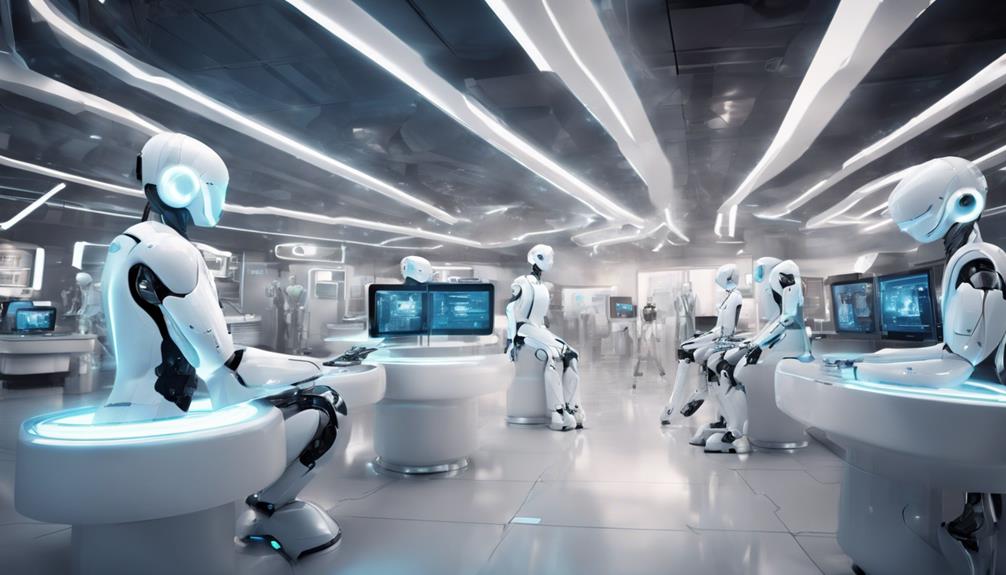As artificial intelligence advances, its influence on customer service grows increasingly significant. Implementing AI-powered solutions is revolutionizing traditional methods of customer interaction, leading to more efficient processes and greatly improved outcomes.
While the idea of AI replacing humans in customer service raises concerns, it also sparks discussions about the evolving landscape of customer support. Understanding the nuances of this shift and the potential benefits and challenges it presents is crucial for businesses aiming to stay competitive in a rapidly evolving market.
Key Takeaways
- AI enhances efficiency and responsiveness, reducing the need for human intervention.
- Cost savings of up to 30% can be achieved through AI integration.
- Human-AI collaboration challenges include consistency in communication styles and empathy.
- Future human roles focus on creativity, personalization, and building customer loyalty.
Impact of AI on Customer Interaction
In the realm of customer interaction, the integration of AI technology has brought about significant transformations in efficiency and responsiveness. AI has the capability to handle up to 80% of routine customer service inquiries, leading to a remarkable reduction in response times by 99% compared to human agents. This efficiency not only enhances customer support but also contributes to cost savings of up to 30%. AI technologies, such as Machine Learning and Natural Language Processing, enable computers to comprehend human languages in customer interactions, paving the way for improved customer experiences.
While AI excels in providing fast and accurate responses, it struggles with complex, nuanced, or emotional customer issues due to the lack of empathy and understanding of human emotions. Therefore, while AI can augment human support by offering contextual data and solutions, it may not entirely replace the need for human interaction in customer service roles. The future of work in customer service lies in finding the right balance between AI assistance and human touch to deliver personalized service and enhance the overall customer experience.
Efficiency Gains Through AI Integration

The integration of AI technology in customer service operations not only streamlines processes and reduces costs but also significantly enhances efficiency by automating routine tasks and improving response times.
Implementing AI in customer service can lead to a 30% reduction in customer service costs. AI has the capability to handle up to 80% of routine customer service inquiries, resulting in improved efficiency. Response times can be reduced by 99% compared to human agents when AI is utilized, showcasing the efficiency gains through AI integration.
Moreover, AI integration allows human agents to dedicate their time and expertise to addressing more complex customer issues, thereby enhancing productivity. Automation through AI plays a pivotal role in boosting customer satisfaction levels by providing faster and more accurate service.
As AI continues to advance, the efficiency gains in customer service through automation and streamlined processes are set to revolutionize the industry, ensuring a seamless and efficient customer experience.
Challenges in Human-AI Collaboration
Effective collaboration between humans and AI in customer service presents a dynamic challenge requiring a delicate balance of brand consistency, seamless transitions, and the harmonization of efficiency with empathy. One of the key challenges is maintaining consistent brand communication styles and tones across both human and AI interactions.
Ensuring seamless transitions between AI tools and human agents is crucial to providing a cohesive customer experience. Balancing the use of AI for efficiency with the need for human emotional intelligence and understanding in customer interactions remains a fundamental challenge. AI may struggle to grasp complex or nuanced customer issues that require human empathy.
To address these challenges, clear protocols and comprehensive training are essential to optimize the strengths of both human and AI support. Navigating these obstacles will be imperative in the evolution of customer service jobs, where the collaboration between human and AI elements plays a pivotal role in delivering exceptional customer experiences.
Future Role of Humans in Customer Service

Amidst the increasing integration of AI in customer service, the future role of humans is poised to pivot towards specialized, high-touch interactions that demand empathy and creativity. Human agents will be essential in providing personalized solutions, fostering customer loyalty, and enhancing overall customer experiences.
Here is a glimpse of what the future role of humans in customer service might encompass:
- Empathy: Human agents will excel in understanding and empathizing with customers' emotions, especially in complex or delicate situations where a personal touch is crucial.
- Creativity: Humans will leverage their creativity to come up with innovative solutions to unique customer problems that AI may struggle to address effectively.
- Personalized Solutions: Human agents will focus on tailoring solutions to meet individual customer needs, going beyond standardized responses to deliver customized experiences.
- Customer Loyalty: By building strong relationships and providing exceptional service, human agents will play a vital role in fostering customer loyalty and trust, elements that are fundamental for long-term business success.
Strategies for AI-Driven Customer Support
Moving towards a future where AI plays a prominent role in customer service, businesses are strategically exploring various approaches to optimize AI-driven customer support. Implementing AI-driven customer support strategies can significantly enhance operational efficiencies and customer experiences.
By leveraging AI to automate routine inquiries, businesses can achieve substantial cost savings of up to 30% through task automation. Moreover, AI enables personalized interactions with customers, strengthening CRM systems and providing contextual information to support teams.
AI augments human support by offering contextual data and solutions, allowing human agents to focus on addressing more complex queries effectively. These strategies not only reduce response times by 99% compared to human agents but also streamline processes, enhance data management, and elevate the overall quality of customer service.
As businesses continue to embrace AI in customer support, the strategic implementation of AI-driven solutions will be pivotal in driving success and competitiveness in the evolving landscape of customer service.
Frequently Asked Questions
How Is AI Being Used in Customer Service?
AI is utilized in customer service to automate tasks like order tracking and password resets, enhancing operational efficiency. Chatbots and virtual assistants powered by AI efficiently manage high-volume transactional requests, enabling human agents to focus on complex queries and personalized interactions.
Will AI Replace Call Center Agents?
As AI advances, the question of AI replacing call center agents arises. While AI excels at routine inquiries and boosts efficiency, human agents remain essential for complex issues requiring empathy. The evolving landscape may redefine agent roles.
How Will AI Change Customer Experience?
AI transforms customer experience by providing consistent, convenient, and personalized interactions at scale. It revolutionizes service with speed, efficiency, and empathy while enabling seamless transitions between AI and human agents. This synergy enhances satisfaction and engagement levels.
How Artificial Intelligence Can Replace Human Work?
Artificial intelligence, with its evolving capabilities and efficiencies, has the potential to transform various industries by automating tasks, enhancing productivity, and streamlining processes. Its integration into workflows signifies a shift towards innovative, tech-driven solutions for workforce optimization.
Conclusion
In conclusion, as AI continues to advance in the customer service industry, it is like a double-edged sword, cutting through traditional roles while also paving the way for innovation and efficiency.
The integration of AI in customer service interactions offers a glimpse into the future of a more streamlined and responsive service experience.
Companies must navigate the challenges of human-AI collaboration to ensure a successful transition towards a harmonious coexistence between technology and human touch.









